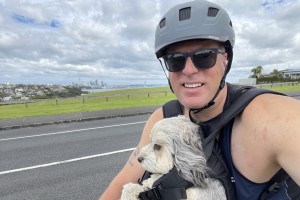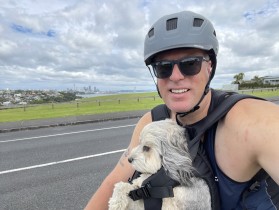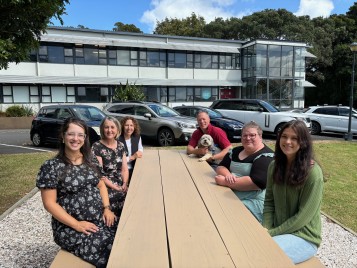
INTERVIEW: We need to be heard to effect action on alcohol, says Alcohol Healthwatch Director
HPF recently caught up with Alcohol Health Watch’s new Executive Director Andrew Galloway, who joined the organisation in October last year, for an indepth-interview about his extensive career.
We also asked Andrew about what prompted his return to the alcohol sector, what he has most noticed on the alcohol landscape, both positive and negative, since returning, and what are some of the main priorities for Alcohol Healthwatch moving forward.
Q: You have had quite an extensive career, which has involved working in various capacities in the alcohol sector. Can you tell us a bit about what your mahi entailed during this period?
A: First, thank you for interviewing me! I am humbled to be interviewed by the Forum and excited to be back in health promotion.
I ended up in public health quite by mistake (albeit a happy one). I was studying a BA in Film, TV Media and Social  Sciences with a view to becoming a journalist. In media studies the lecturers then, foreshadowed the future of media (how right they were). I was working in regulatory health promotion for Auckland Regional Public Health Service undertaking alcohol licensing enquiries on behalf of the Medical Officer of Health. I found I could tell a good yarn and make a difference through health promotion – so it was a very happy landing for a career in health promotion and regulatory leadership.
Sciences with a view to becoming a journalist. In media studies the lecturers then, foreshadowed the future of media (how right they were). I was working in regulatory health promotion for Auckland Regional Public Health Service undertaking alcohol licensing enquiries on behalf of the Medical Officer of Health. I found I could tell a good yarn and make a difference through health promotion – so it was a very happy landing for a career in health promotion and regulatory leadership.
From ARPHS I developed into a role with the Alcohol Advisory Council of New Zealand (ALAC). My role was when I started as the project manager of supply control strategies. That meant overseeing our resources, programmes and training in host responsibility, training for Sale of Liquor Act 1989 and leading projects such as the management of alcohol at large events, with an eye to using the Rugby World Cup 2011 as a catalyst. I also managed ALACs important annual conferences. ALAC, in my view was a dynamic autonomous crown entity with a bold vision, an empowering board (Council) and a great CEO, Gerard Vaughan. Gerard was a great leader who really lifted people to see their potential, and during this time I grew the most in any job I think I have had. Many of my positive leadership traits can be attributed to leaders like Gerard. While at ALAC I undertook further professional post graduate development in public policy at the Victoria University of Wellington.
When ALAC was disestablished, I took the opportunity to turn my hand in local Government leadership, first as the manager of liquor licensing and street trading, then as the manager of community safety (overseeing Community Action on Youth and Drugs (CAYAD), injury prevention, alcohol harm reduction, homelessness, safety and graffiti eradication / prevention). Working at Council was exciting, busy and involved a lot of change. I had a tough job seeing the Sale and Supply of Alcohol Act 2012 implementation on the ground in our biggest city and reorganising teams with the result of the merger of eight legacy Councils.
I was encouraged to apply for the Northern Region Manager (alcohol and community) role with the Health Promotion Agency (HPA) and really loved the ability that role provided to work with communities to reduce alcohol harm. In my view, HPA in their alcohol mahi was a light under a bushel compared to ALAC, but we still made a difference where we could. HPA was not an autonomous crown entity, which is a small but significant difference.
Had it not been for the work I was empowered to do with the community interface we had, I probably would not have lasted over 5 years with HPA. I also enjoyed building the profile of HPA in the Northern Region.
Q: In 2018, your career seemed to take quite a different direction, when you took up several leadership roles in organisations such as the Ministry of Business, Innovation and Employment and Immigration NZ, to name a few. This must have been quite a change for you, and what experience did you think you gained during this time that will set you in good stead for the role you are in now?
A: Correct. Alcohol health promotion is a long-game exercise. The evidence is clear of what we need to do, there is such a consensus, but political action is often the most lacking. Governments on both sides have not had the courage to do the most effective things. Coupled with the desire I had at the time to put my hand to a new challenge, I tried out working as a regulator in the core public service.
Working in the Immigration Advisers Authority, as the Registrar of Immigration Advisers was a great new challenge. We licensed Immigration Advisers in New Zealand and abroad – part of what now is the occupational licensing team at MBIE. We also took complaints about licensed advisers and enforced the law when it came to people giving immigration advice without a licence (a criminal offence). Those harmed by poor immigration advice (or unlicensed advice) would sometimes become unlawful onshore, or return offshore, so our role was particularly challenging gathering evidence, maintaining witnesses and at times arranging travel for witnesses to return to New Zealand to give evidence. We were part of MBIE, but fiercely independent of Immigration New Zealand – to offer that protection to people who may make complaints to us.
It was novel to lead a regulatory team with extra-territorial jurisdiction (meaning the law applies offshore) and I ended up travelling to India for a whirlwind trip in 2018 to raise awareness of our regime and see the local context there. It’s fascinating, there are whole towns geared towards migration to USA, Canada, Australia or New Zealand.
After the challenge of regulating immigration advisers, I ended up taking a role leading the Immigration Border Operation for Immigration New Zealand. I started in January 2020, which was three weeks before we closed the border to China, owing to the then novel coronavirus disease. As you will know, that developed into COVID-19 and I was to play a key role in managing a closed border operation, for the first time in New Zealand’s history.
One of my key concerns (on top of many thousands or border exemptions) was for the wellbeing of the large teams of people I had responsibility for. Seeing our people through compulsory testing, early required vaccination and looking out for their physical and mental wellbeing while they masterfully managed the restricted flow of passengers into New Zealand (air and maritime border) was a priority. Long hours and stressful times were aplenty.
Having a general knowledge of public health was an absolute asset in this regulatory leadership role – a pattern that continued with my next adventure.
After two years and not enough sleep managing the Border, I took a role as the regional operations manager overseeing the Auckland South team of the Tenancy Compliance and Investigations team based in Manukau.
Our mission was simple; to protect tenants. We worked closely with Council, Fire and Emergency New Zealand, NGOs and health agencies to collectively take action on fairly some sketchy landlords. The team really were fabulous and provided tenants with protection. We took cases to the tribunal and had costs awarded to mitigate the losses where a property was so bad – no one should ever have lived there. Of course, there are good landlords and good property managers, but we saw the worst, too often.
After tenancy services (MBIE) I worked as the portfolio manager for the upper North Island team for Safer Commercial Transport at Waka Kotahi, now the NZTA. Overseeing the two compliance teams for the region was in addition to the portfolios I managed: passenger services (bus, taxi, ride-share), insurance and ports. The idea of the portfolio approach was to bring a system view to regulatory – something of an innovation in regulatory practice. I loved it.
Given my emergency management experience, alongside my day job I was quickly adopted by the National Emergency Response Team at Waka Kotahi in response to Cyclone Gabrielle and other severe weather events. It was like being back at Border all over again with long days, busy incident management teams and wicked problems to overcome.
I must tip my hat to the teams at Waka Kotahi, especially Transport Services (who manage road contractors and services). Their teams communicated real-time with the transport network keeping essential goods flowing into damaged areas, implemented bailey bridges reconnecting hard-to-reach communities and they pulled out all stops to get it done. You hear a lot about the ‘state of the road network’, and while that is a problem, the people working at Waka Kotahi are some of the best in the business.
Alongside my working career I was a volunteer fire fighter for 16 years. I went to hundreds of working jobs and saw the harm alcohol causes first hand. This strengthened my passion for making a difference and reducing harm. Volunteering got into my blood, and now I give my time as an Honorary Fisheries Officer and Justice of the Peace for New Zealand. I cherish the contact all these roles offer with everyday New Zealanders.
The takeaway in all the varied career opportunities I have had the fortune to do, both paid and volunteer; there is always, always more that we can do.
A couple of my favourite quotes that get me through when the going gets tough are:
Never doubt that a small group of thoughtful, committed citizens can change the world; indeed, it's the only thing that ever has. (Margaret Mead)
The only thing necessary for the triumph of evil is for good men to do nothing. (Edmund Burke).
Q: What prompted you to return to the sector by taking up your new role at Alcohol Healthwatch and what have you most noticed on the alcohol landscape in Aotearoa, both positive and negative, since returning?

Well, good question. I had been prompted by some sector stakeholders to think about it. The first two times I said no. I was happy doing my new chosen vocation as a system regulator.
The third time the role was advertised, I had a good think about it and did some research. There was still a fire in my belly for alcohol health promotion. I know it’s a long game. I know it is tough going. I DO like a challenge. So, on the third time it was advertised I tossed my hat in the ring.
(Andrew pictured with the Alcohol Healthwatch team, fr left, Sarah Sneyd (health promotion advisor), Suzanne Lopes (office manager), Jennifer Lamm (health promotion advisor), Catherine Anderson (health promotion advisor) and Lizzie Barratt (graduate health promotion advisor).
I met with the Board and really loved the discussion. I had long admired Alcohol Healthwatch both under Rebecca Williams’ lead and then with Dr Nicki Jackson at the helm.
AHW has been a stalwart of evidence based public health advice and a heavy hitter in terms of the achievements it’s delivered with the sector. It was my turn to take the lead and I am loving working with our small, dedicated team and also back working with the stakeholders.
Upon returning to the sector, there were some changes. We had not seen much progress in national alcohol policy until the brave MP Chlӧe Swarbrick entered the ring.
We enjoyed seeing the passage of the Community Empowerment amendment to the Sale and Supply of Alcohol Act 2012. It provided some modest but hopefully meaningful changes to how communities can effect change in the availability of alcohol.
New big players in public health have emerged and are prominent, such as Health Coalition Aotearoa and the Cancer Society. These big players now feature as health promotion and policy heavyweights in alcohol. The researchers and academics are of course still prominent and making a massive difference in growing the evidence.
I am heartened by the discourse towards a Global Framework on Alcohol Control – which we would love to see
Alcohol Healthwatch's Health Promotion Advisor Sarah Sneyd talking recently about supplying zero alcohol to children on One News. Watch HERE.
developed and implemented.
On the negative side, we see as ubiquitous as ever, the cheap price of alcohol and harmful marketing that is now pushing to online audiences – where there are precious few controls.
We have also seen, thanks in part to COVID-19, a growth in the rapid delivery of alcohol. AHW will have more to say on this soon!
Q: There have been some major changes to alcohol legislation over the past year or so, such as the amendment to the Sale and Supply of Alcohol Act 2012, which removed the ability to appeal local alcohol policies. How much more do you think needs to be done to keep this momentum on alcohol policy reform, especially in areas such as realising alcohol advertising-free environments and reducing the adorability of alcohol?
A: The Community Empowerment amendment to the Sale and Supply of Alcohol Act 2012 sees some improvements, though I wouldn’t say major. Removal of the appeal provisions to local alcohol policies is a no-brainer. We said in ALACs 2011 submission to the Justice and Electoral Select Committee that having an appeals provision was a mistake. We foreshadowed that this would only delay the implementation of public health focused policy, and it gives me no satisfaction to look back and say we were right.
We will see if the changes reduce the delay tactics the alcohol industry are so adept at forcing. The alcohol industry boasts some of the best and sharpest legal minds on retainer. I never discount their ability to hoodwink efforts to minimise alcohol harm, especially delaying or thwarting positive policy change. We of course are on-guard to defend the amendment from repeal – which we know is an idea the lobby will be busily working to promote inside the corridors of power.
More that needs to be done… well, we can look at the most effective recommendations that the Law Commission recommended for a start.
I would begin with those measures that were not picked up at the time the Commission presented the landmark review of the legal framework on alcohol. Minimum price, excise tax increase, and the phasing out of alcohol marketing and sponsorship are obvious as the next effective evidence-based strategies for alcohol. Important too, is recognising Te Tiriti in the Act and alcohol regulations. No small order in any political reality.
We are hearing a bit of noise about some action on Fetal Alcohol Spectrum Disorder (FASD) which is very welcome – there is so much we need to do in that space too!
Q: What are some of the main priorities and goals for Alcohol Healthwatch moving forward?
A: My priority is ensuring AHW remain relevant, pragmatic and reasonable; especially in the public discourse. We need to be heard to effect action on alcohol.
In public health advocacy I think we always need to always read the room. Sometimes we might have an opportunity to win a battle but be exhausted or have no firepower left when the war comes, figuratively speaking.
So, for me, it’s about being astute and retaining some capacity for change when the time is right.
I am keen to maintain AHWs role of growing and harnessing the capacity of our amazing sector and community actors to do their best work with the latest evidence. Also maintaining the already high public support for what works.
I think we have an incredible opportunity for change. We have emerging credible global public health evidence around the fact there is no safe limit for alcohol consumption.
It is conceivable and possible that in my lifetime we will see a massive shift in awareness, attitudes, and behaviours towards alcohol – but we need to take people with us on that journey. We are seeing more and more prominent New Zealanders taking this on; recently we’ve seen Guyon Espiner and Paddy Gower join Lotta Dann in their efforts to go alcohol free.
Ours is not a mission any one agency or even Government can do alone.
It really will take the organised efforts of society to galvanise support for and effect change in alcohol. We need to take everyone with us. I am up for the challenge, who is with me?